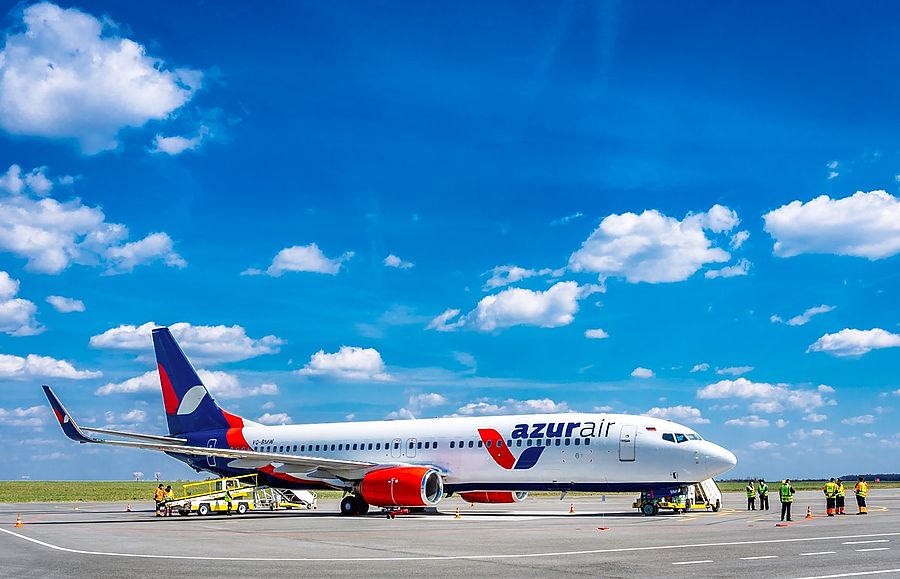A deputy director of Russia’s Azur Air Company, Andrei Mukanin, stated that the company is having some of its planes’ engines serviced in Iran.
“We carry out all types of aircraft maintenance ourselves ... [ellipses in original]. Iran helps us from the point of view of repairing our engines. They are there,” TASS news agency quoted Mukanin saying on October 26.
Mukanin declined to specify the number of engines being repaired, emphasizing that this does not impact the planned flight schedule or flight safety.
In April 2023, Aeroflot, the Russian flag-carrier airline, sent one of its aircraft to Iran for servicing and a C-check, marking the first such collaboration. On April 5, Aeroflot dispatched one of its Airbus A330-300 aircraft to Tehran for servicing by Mahan Air, with Mahan Air primarily focusing on overhauling the plane’s undercarriage.
Western sanctions have forced Russian airlines to seek alternative sources for aircraft maintenance and parts due to restrictions imposed after Russia invaded Ukraine in February 2022. Russian airlines continue to operate Western aircraft but face challenges in importing replacement parts.
Both Iran and Russia, confronting Western sanctions, have significantly strengthened their relations across various sectors, notably in military and defense cooperation, solidifying their status as close allies.
On October 25, Iranian First Vice-President Mohammad Mokhber and Russian Prime Minister Mikhail Mishustin, meeting in Kyrgyzstan, discussed their “record” levels of bilateral trade and explored avenues to further enhance economic collaboration on the eve of a prime ministerial meeting of the Shanghai Cooperation Organization (SCO) held in Kyrgyzstan.
Mokhber highlighted the positive trajectory of “strategic ties” between the two countries and stressed the importance of breaking down visa barriers to facilitate future bilateral growth. He emphasized the need to implement agreements in areas such as the aeronautical industry, the development of transit links, the completion of the Rasht-Astara railway link, and the connection of the national power grids of Iran, Russia, and Azerbaijan. Mokhber also urged close monitoring of bilateral cooperation arrangements in the oil and gas sector.
In response, Mishustin noted that bilateral trade had reached a new record of 350 billion roubles ($3.8 billion) in the previous year and expressed Moscow’s eagerness to further expand these ties. He also expressed Russia’s interest in increasing tourism from Iran and announced plans to issue electronic business, tourism, and academic visas for Iranian citizens.
The two sides agreed to explore the possibility of transporting gas between Iran and Russia through Kazakhstan, Uzbekistan, and Turkmenistan, as well as prospects for overland cargo transport between Iran, Russia, and Azerbaijan.
After a meeting with counterparts from Iran, Türkiye, Azerbaijan, and Armenia within a 3+3 format meeting in Tehran on October 23, Russian Foreign Minister Sergei Lavrov reported that a “comprehensive strategic partnership agreement” with Iran is nearly finalized.
“The preparation of a new big agreement is at an advanced stage. I would say 85% have already been agreed upon. Some specific issues remain on which an active negotiation process is underway,” Lavrov said.
He emphasized that the ongoing Israeli-Palestinian conflict does not directly impact the negotiations between Moscow and Tehran regarding the agreement.
During his meeting with Iranian President Ebrahim Raisi and Foreign Minister Hossein Amir-Abdollahian, Lavrov discussed various aspects of Russian-Iranian relations, with a particular focus on joint projects in the energy and logistics sectors, including the full activation of the North-South international transport corridor.
The International North-South Transport Corridor (INSTC) is a multimodal network covering 7,200 kilometers of ship, rail, and road routes, designed to provide the shortest multi-modal transportation route linking the Indian Ocean and the Persian Gulf to the Caspian and Baltic Seas.
The INSTC currently integrates multiple transport systems across various countries, with Russia and Iran contributing the most to the infrastructure development projects, accounting for 34.6% and 33.7% of total planned investments, respectively.







 President Ilham Aliyev shed light on the evolving contours of the peace process with Armenia during an international conference in Baku this week. ...
President Ilham Aliyev shed light on the evolving contours of the peace process with Armenia during an international conference in Baku this week. ...
 Azerbaijan and Armenia started the process of demarcation of their border on Tuesday, with the installation of the first border markers based on ge...
Azerbaijan and Armenia started the process of demarcation of their border on Tuesday, with the installation of the first border markers based on ge...
 Iranian President Ebrahim Raisi expressed Tehran’s readiness to participate in significant development projects in Sri Lanka during the inauguratio...
Iranian President Ebrahim Raisi expressed Tehran’s readiness to participate in significant development projects in Sri Lanka during the inauguratio...
 Iran and Pakistan have signed eight cooperation documents in various fields, and agreed to strengthen ties to fight terrorism in the region.
Iran and Pakistan have signed eight cooperation documents in various fields, and agreed to strengthen ties to fight terrorism in the region.
 As the conflict between Ukraine and Russia escalates, the strategic importance of Kharkiv, Ukraine's second-largest city, has come sharply into focus.
As the conflict between Ukraine and Russia escalates, the strategic importance of Kharkiv, Ukraine's second-largest city, has come sharply into focus.



